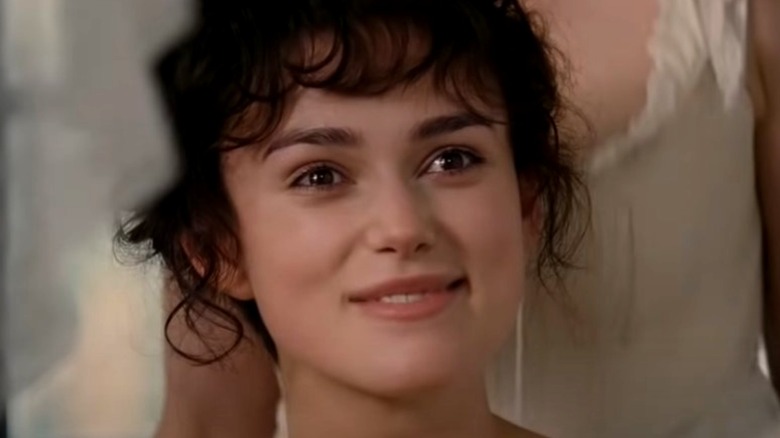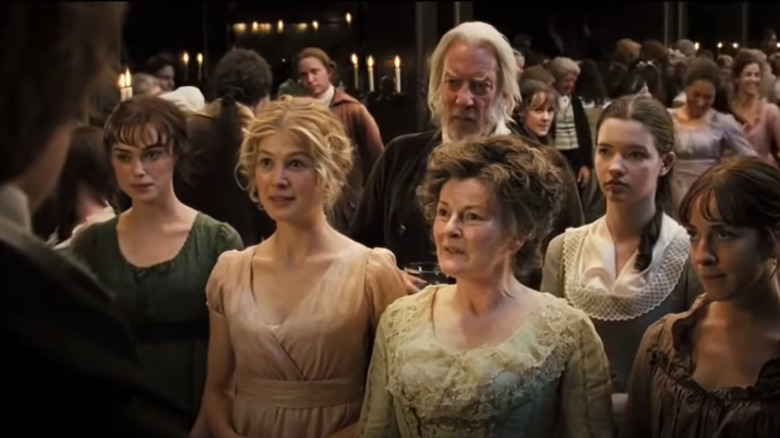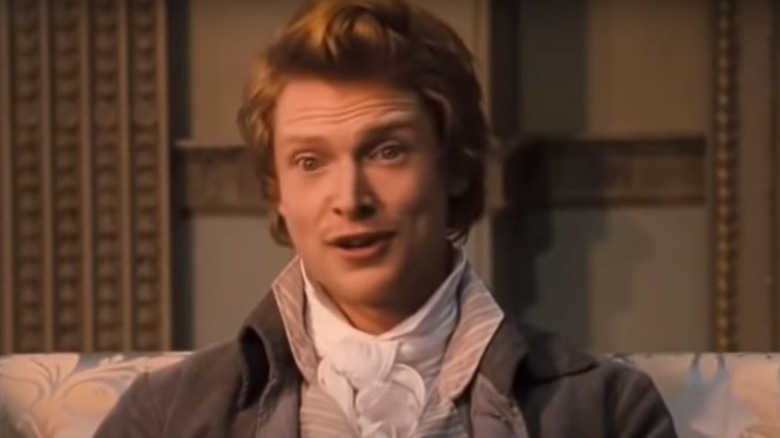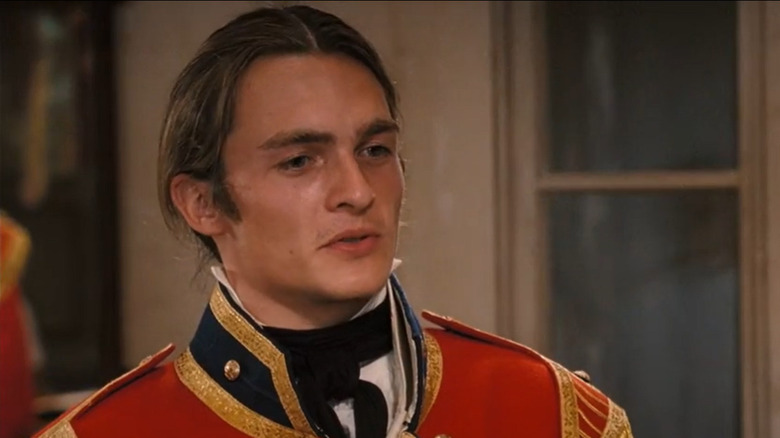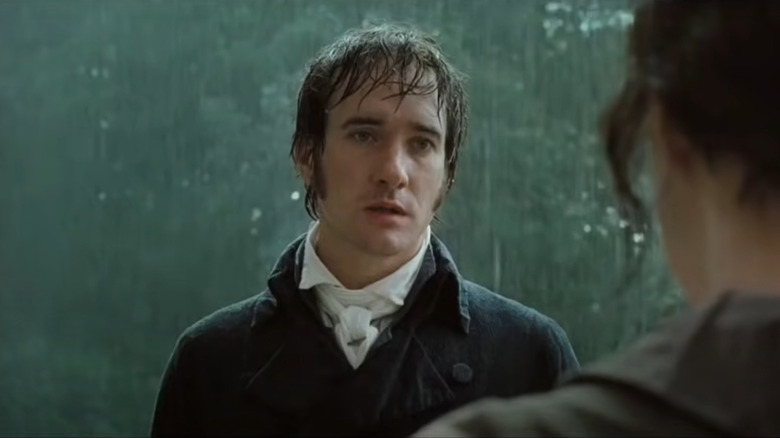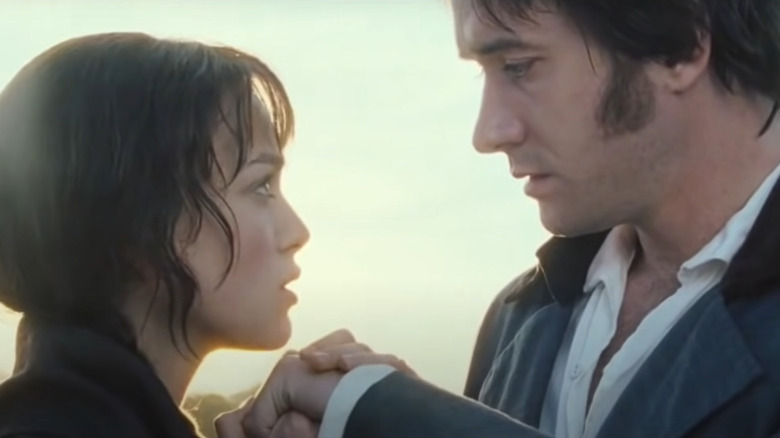The Ending Of Pride And Prejudice Explained
Jane Austen is possibly the only storyteller to ever stand toe-to-toe with William Shakespeare. No, that sentence has nothing to do with their personal writing qualities — but rather, everything to do with the number of adaptations that their works have received. For each "Romeo and Juliet" remake that Hollywood cranks out, there's also a "Pride and Prejudice" project, and for every "Hamlet" reskin ... there's another, well, "Pride and Prejudice" property.
Basically, there's just a ridiculous amount of "Pride and Prejudice" retellings. In 2016 alone, Hallmark released "Unleashing Mr. Darcy" at almost the same time that Lionsgate released the horror-comedy "Pride and Prejudice and Zombies."
So, maybe not all the adaptations are entirely faithful. Perhaps one of the most beloved –- and most respectful –- adaptations, though, is the 2005 Universal Pictures film that allowed the title to remain the same as that of the source material. This project starred Kiera Knightley fresh off the success of "Pirates of The Caribbean," along with talents such as Matthew MacFeydan, Rupert Friend, and Tom Hollander (also of "Pirates" fame). It's been quite a few years since its release, and English professors across America are still assigning it as required viewing material, so here's a breakdown of "Pride and Prejudice," and how it ended.
(Most of) the Bennets are on the prowl for a good man
To fully understand the ending, it's important to know how it started. The story, set in 18th century rural England, centers around the Bennet family, which is comprised of Mr. Bennet (Donald Sutherland), Mrs. Bennet (Brenda Blethyn), and their five daughters, Jane (Rosamund Pike), Elizabeth (Kiera Knightley), Mary (Talulah Riley), Kitty (Carey Mulligan), and Lydia (Jena Malone). The plot is driven by Mr. and Mrs. Bennet's desire to find suitable husbands for their daughters as they are not allowed to inherit much of what little is left of the Bennet fortune on account of being women in the 18th century. All the young Bennet women broadly go along with their parent's wishes ... except for Elizabeth, the second eldest, who insists upon marrying for love rather than money.
By today's standard, Elizabeth is nearer the norm than the outlier, but within the confines of "Pride and Prejudice," she's considered impertinent and wild. She refuses to bend her will to the societal expectations whenever doing so won't directly harm her family, and even then, she stands her ground more often than not. Interestingly, she's the favorite of her father, and the least favorite of her mother, for this very behavior. The bulk of the storyline follows her interactions with a handful of suitors. One more than the others, but that's for later.
Bingley is a potential candidate until he isn't ... until he is again
The first promising suitor that comes into play is Charles Bingley (Simon Wood), a wealthy bachelor that moves nearby. Although he's never interested in Elizabeth, he displays a strong enamorment with Jane, the eldest Bennet daughter. The two seem to hit it off pretty well, so much so that she goes to visit him shortly thereafter, until suddenly, it stops. All at once, Bingley ends his pursuance of Jane, and it's solely thanks to his snobby friend, Fitzwilliam Darcy Esquire (Matthew MacFeydan) — because Mr. Darcy, as he's most commonly referred to, believes the pairing is beneath Bingley, and interferes to speak that very thing.
For his part, Bingley is not shown to have objected. While he's both wealthy and kind, he's easily persuaded by more firm minds and Mr. Darcy is nothing if not firm. He does eventually propose to Jane, who happily accepts, but only after Mr. Darcy has a change of heart about the Bennet family. Much like the ambiguity which surrounds his agreement with Darcy over the original separation, it's not shown as to whether he sought his friend's approval to finalize the proposal. The simplest interpretation is that Bingley saw Darcy cave to love, and decided to follow suit, as his repercussions would be lesser if his actions mirrored those of the man he so admired.
Wickham is the quintessential rakehell
Lieutenant George Wickham (Rupert Friend) is actually the third potential suitor that comes into contact with the Bennet family, the second of whom was a pompous clergyman named William Collins (Tom Hollander) that Elizabeth soundly denies, much to her mother's chagrin. Unlike Collins, who immediately throws his proposal to each sister in order of succession with gross indifference, Wickham wins the good graces of the Bennet family with comfortable charm and a massive dose of being naturally hot. A sob story centering himself as the victim and Mr. Darcy as the aggressor does nothing to harm his chances with Elizabeth, either, who already hates Darcy for his interference with Jane's potential betrothal.
But Wickham is later revealed to be a liar on all accounts. At no point is he a victim of any wrongdoing other than his own, having squandered a small fortune left to him by Darcy's father through gambling and other unsavory pursuits. Further, he tries to seduce Darcy's younger sister in order to possess her inheritance, as well.
Wickham serves as a warning to anyone smitten with a fanciful first impression. Eventually, it's revealed that he runs away with Lydia, much to her family's horror. That particular situation doesn't end well, per se, but the blow is softened by another bout of interference, thanks once again to Mr. Darcy.
Darcy disguises love with scorn, which is a really bad strategy
At this point, it should be noted that Mr. Darcy is something of a severe busybody, although it would be unfair to suggest he came by it on it his own merits. His aunt, Lady Catherine de Bourgh (Judi Dench) is his last surviving parental figure and the living embodiment of the system in which he was raised. That being said, Mr. Darcy is a man of his own confidence, and does not shy away from standing for what he believes proper. In this way, he is the opposite of Bingely. He's also incredibly selective about his peers, which sets him apart from Collins. Lastly — and most hilariously — he is also a snobby tool whose first impressions are the definition of arrogance. In this way, he's distinctly the opposite of Wickham, who hides his true self.
From the start, Darcy openly detests Elizabeth for her forward behavior. His system of rules condemns her independence. For her part, Elizabeth shares the sentiment in reverse, loathing him for his blatant, vocalized cruelty. Despite this, or perhaps due to it, Darcy gradually falls irrevocably in love with Elizabeth. He seems equally enthralled and appalled by this notion and makes no secret of that opinion when he opens himself up to the woman who unwillingly stole his heart. Upon his first advance, Elizabeth shoots him down hard but, as we've mentioned, Darcy is both stubborn and selective. Instead of giving up, he changes his tactic — for once in his toity life, he tries kindness.
Elizabeth's final decision is hotly contested to this day
Depending on who answers the question, Elizabeth is either perceived as a romantic victor or as a failed feminist because, ultimately, she agrees to Darcy's proposal. There's no doubt that her decision was in part influenced by a desire to stick it to Lady Catherine, who literally made a special trip to the Bennet home just to tell Elizabeth to refuse Darcy. With such an easy burn available, who wouldn't take that chance? In reality, though, the reasons she accepts Darcy's hand in marriage are probably a lot closer to her own heart. In a one-two punch, her erstwhile lover wrote a detailed letter that shed light on Wickham's true nature, although it would have been better if he'd simply explained it when Elizabeth first threw the rakehell's lies in Darcy's face.
Secondly, and more importantly, Darcy exercises his powers of persuasion over Wickham, forcing him to marry Lydia. By doing so, he procures her a more stable (although still rocky) future. He also returns a modicum of propriety and honor to the entire Bennet house with his actions. Again, this is the 18th century, and honor is a pretentious form of currency with which the upper crust trade. To Elizabeth, family is dearly important, so when Darcy brings them peace, he shows her a willingness to care for what matters to her.
Here's where the arguments begin: Should Elizabeth have accepted Darcy? This debate goes back to the source material, and indeed, as The Economist assessed, views on Mr. Darcy have varied tremendously over the decades. Here's one conclusion: Elizabeth does not position herself as a rebel, but as a woman with standards. Darcy changes himself to meet her standards. Honestly, that's a win.
